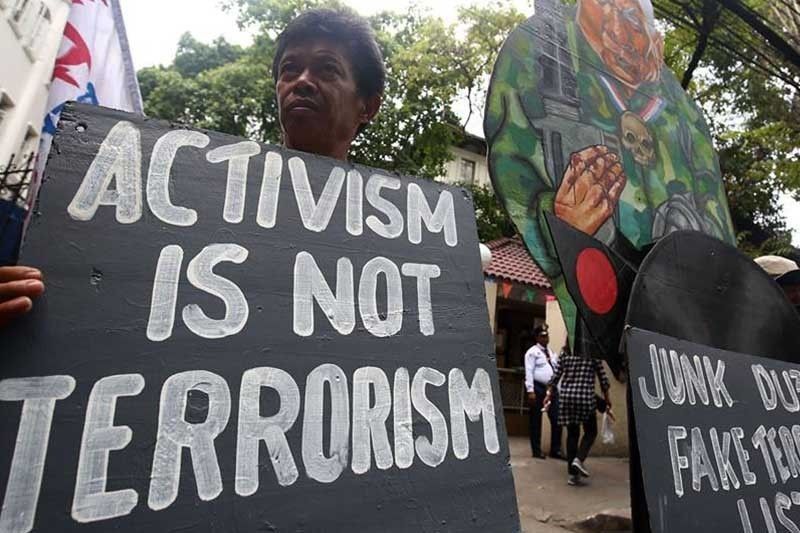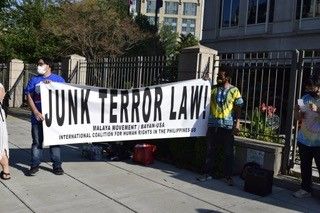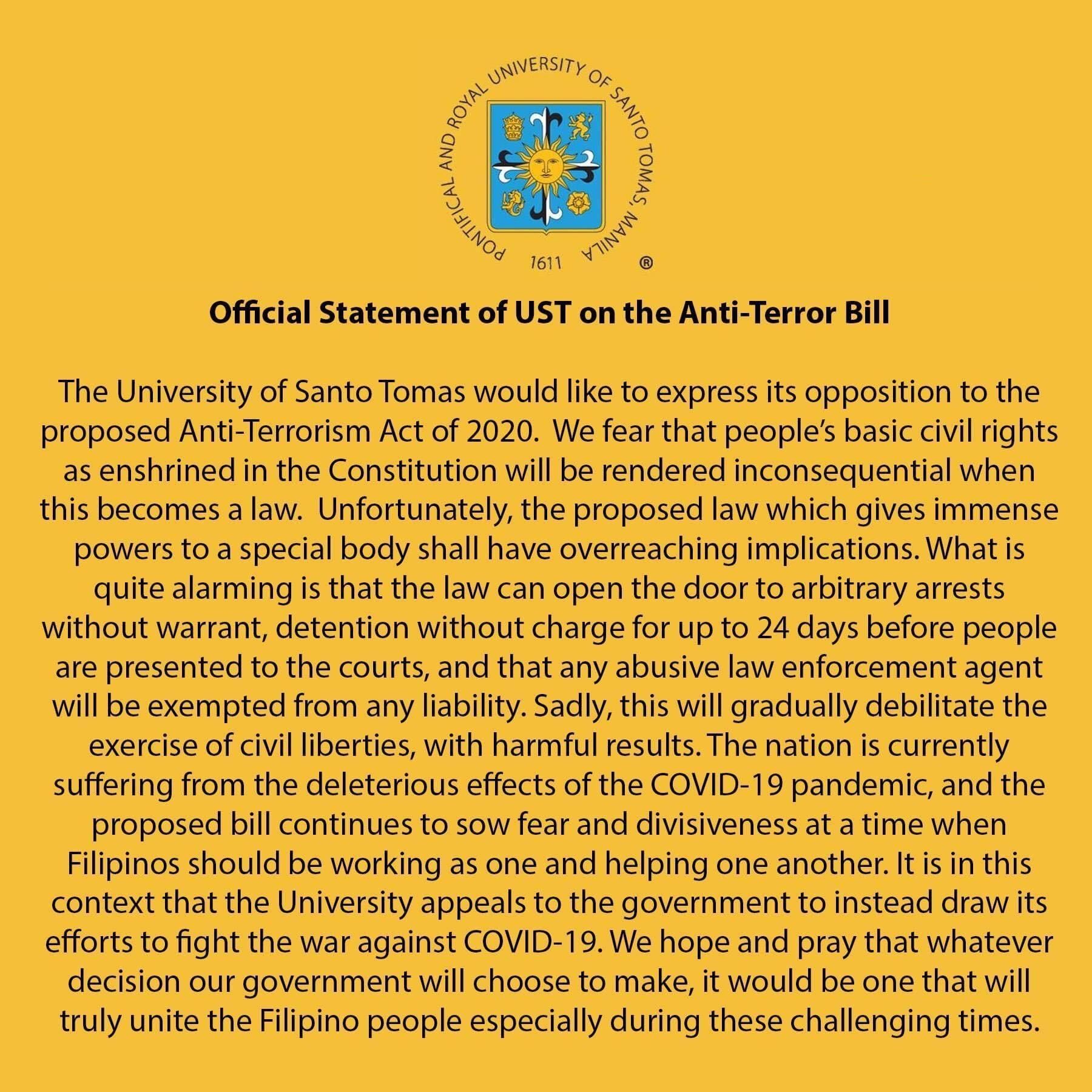Anti-Terrorism Law

National Security Adviser Hermogenes Esperon moves to block access to several websites, including news sites of alternative news orrganizations Bulatlat.com and Pinoyweekly.org.
In his letter to the National Telecommunications Commission, he only says the websites are "affiliated to and are supporting these terrorists and terrorist organizations."
No other basis to back up his allegation was cited in the letter.
Citing the designation of the CPP-NPA-NDF as terrorists, NSA Hermogenes Esperon moves to block access to several sites.
— Kristine Patag (@kristinepatag) June 22, 2022
In Esperon's letter to the NTC, he included news sites @bulatlat and @pinoyweekly; sites of other progressive groups RMP and Save our Schools. @PhilstarNews pic.twitter.com/nAzMITJFsS
The Commission on Human Rights says it "partly welcomes" the Supreme Court decision that some parts of the controversial Anti-terrorism Law are unconstitutional.
CHR spokesperson Jacqueline de Guia says the commission remains hopeful that the remaining contentious provisions of the law will be clarified by the high cour in the full text of the decision.
"At the same time, our commitment remains in guarding against possible human rights violations arising from the implementation of the anti-terror law. We steadfastly remind the government that countering terrorism and protecting human rights are not competing values but are, in fact, mutual and complementary," De Guia says in a statement.
The Supreme Court has deliberated and voted on the controversial Anti-Terrorism Act but the decision will be released "at the soonest time possible."
"However, considering that there were numerous issues resolved in the case, as well as the fact that each Justice had to vote on each issue, there is a need to accurately confirm and tally the vote of each Justice in order to ensure the correct resolution of the Court per issue," SC spokesperson Brian Hosaka says.
The Anti-Terrorism Council designates the National Democratic Front of the Philippines, the panel that negotiates for communist rebels during peace talks a terrorist organization.
Previous designation of the Communist Party of the Philippines and New People's Army led to the designation of supposed members of the CPP's Central Committee. Among those designated as terorrists were peace consultants.
Designation gives the Anti-Terrorism Council the authority to investigate and freeze the accounts of designated persons.
The Anti-Terrorism Council has designated 29 people, including alleged members of the Communist Party of the Philippines-New People's Army, as terrorists in two resolutions.
Designation allows the Anti-Money Laundering Council to freeze the assets of those on the list.
Solicitor General Jose Calida tells the Supreme Court that the Philippines must have an Anti-Terrorism Act because of international obligations.
Calida says "supervening events warrant ouright dismissal of petitions." He notes there are already cases involving ATA, such as case against farmers Japer Gurung and Junior Ramos, and three individuals in Negros Occidental.
He says petitioners do not have standing to question the law since they are not directly affected by it.
Oral arguments on petitions against the Anti-Terrorism Act will resume on April 27 at 2:30 p.m..
According to a Supreme Court advisory, the arguments will be carried out through videoconferencing due to the pandemic.
Oral arguments on the Anti-Terrorism Act of 2020 scheduled on March 23 is suspended due to the "alarming increase of COVID cases."
Supreme Court Clerk of Court Edgar Aricheta says the oral arguments will resume on April 6 at 2:30 p.m.
The oral arguments on the petitions against the controversial Anti-Terrorism Act of 2020 will resume on March 23.
The Supreme Court announces that the oral arguments scheduled on March 16 is suspended.
Oral Arguments on the Anti-Terrorism Act of 2020 (RA 11479) will resume on March 23, 2021 at 2:30pm. #ATAOrals pic.twitter.com/y4uOE4nxLX
— Philippine Supreme Court Public Information Office (@SCPh_PIO) March 15, 2021
Oral arguments on the Anti-Terrorism Act, initially pushed back to March 16, are suspended to give way to disinfection of Supreme Court buildings and offices.
Chief Justice Diosdado M. Peralta extends work suspension in the Supreme Court until March 16, 2021 as the different buildings and offices continue to be disinfected; Oral Arguments for G.R. No. 252578, et al. on March 16, 2021 is suspended. pic.twitter.com/jPVv93f1BK
— Philippine Supreme Court Public Information Office (@SCPh_PIO) March 14, 2021
Oral arguments on the Anti-Terrorism Act will not push through on Tuesday because some justices are on self-quarantine, the Supreme Court Clerk of Court says.
Debate to resume on March 16.
The fourth day of Oral arguments on the petitions against the Anti-Terrorism Law, which was scheduled on February 23, is suspended.
The Supreme Court says the oral arguments will resume on March 2 at 2:30 p.m.
SC clerk of court Edgar Aricheta says some of the justices are on self quarantine as a precaution against COVID-19.
Oral Arguments on the Anti-Terrorism Act of 2020 (RA 11479) will resume on March 2, 2021 at 2:30pm. https://t.co/EmDwhhia0a #ATAOrals pic.twitter.com/uAJEj0Vpps
— Philippine Supreme Court Public Information Office (@SCPh_PIO) February 22, 2021
Solicitor General Jose Calida says Aeta farmers Japer Gurung and Junior Ramos are withdrawing their petition-in-intervention to join the legal fight against the Anti-Terrorism Act.
He says, citing affidavits from the National Commission on Indigenous Peoples' and the Public Attorney's Office, that the two say they were offered P1,000 to sign the petition.
They say they did not sign the petition-in-intervention voluntarily.
Inquirer.net condemns the threat of Lt. Gen. Antonio Parlade Jr. to sue reporter Tetch Torres-Tupas for her report on two Aetas who sought help from the Supreme Court against the anti-terrorism law.
Parlade accused Torres-Tupas as a propagandist in a Facebook post on February 3.
"INQUIRER.net takes vigorous exception to the apparent red-tagging of our reporter and expresses alarm over Parlade’s attempt to sow fear, stifle dissent and curtail her right to make truthful and objective reports," Inquirer.net says in a statement.
Retired Supreme Court justices Antonio Carpio and Conchita Carpio Morales urge the high court to confirm whether social media post attributed to "Antonio Parlade" is an official communication from the government.
The petitioners ask the SC to direct the Office of the Solicitor General to write an explanation about the post advising the public to be "watchful of groups opposing the anti-terror law.
"Though some portions directly name specific persons, the Post also groups together petitioners as part of 'individuals, groups and organizations' who should be monitored for 'pposing a law that will protect citizens from terrorists,'" the petition read.
The Supreme Court resets oral arguments on anti-terrorism law petitions to February 2, after Solicitor General Jose Calida said his assistant solicitor general and some staff tested positive for COVID-19. — Philstar.com/Kristine Joy Patag
The Anti-Terrorism Council has aproved the Implementing Rules and Regulations for the Anti-Terrorism Law, Justice Secretary Menardo Guevarra confirms.
The implementing guidelines were crafted by a technical working group led by the DOJ, he also says.
"We will disseminate copies to the Congress and to law enforcement agencies as required under the law, and will publish the IRR online and in a newspaper of general circulation in the next few days," he says.
Desaparecidos, an organization made up of families of victims of enforced disappearances, is worried that more may go missing under the anti-terrrorism law.
"We fear that Duterte's terror law will enable State forces to resort to extraordinary measures such as abductions and enforced disappearances like what they did to my daughter to instill fear on its critics and activists as the government spins out of control because of the pandemic and the ailing economy," Erlinda Cadapan, Desaparecidos chairperson and mother of missing University of the Philippines student Sherlyn Cadapan, says in a statement.
She says that Section 29 of the Anti-Terrorism Act allows detention without charges for up to 24 days "practically opens up the option for State forces to resort to enforce disappearance rather than complying with legal requirements to detain suspects."
The Free Legal Assistance Group, which represents senators and media practitioners in a petition against the Anti-Terrorism Act, urges the Supreme Court to issue a temporart restraining order against the new law.
The group says the statement of Armed Forces of the Philippines chief Gilbert Gapay to regulate social media is "repression in broad daylight."
"At the very least, the foregoing statements of the AFP Chief of Staff confirm that the ATA is both so overbroad and vague that it is susceptible to being used for an unconstitutional end, that is a weapon against free speech and dissent," the motion read.
Solicitor General Jose Calida asks the Supreme Court to cancel the oral arguments on the petitions against the anti-terrorism law.
Calida cites logistical restrictions and health threats posed by the COVID-19 pandemic, noting that oral arguments would entail the presence of members of the Court, at least 300 petitioners and their counsels, 16 OSG lawyers and support staff.
"Further, the sheer number of participants will make it difficult, if not impossible, to maintain social distancing within the En Banc Session Hall. In this regard alone, even puttig the matter of the age and health vulnerabilities of some of the participants aside, it is submitted that their physical presence for in-court oral arguments is inadvisable," Calida says in his urgent motion.
It is not the intention of the anti-terror bill to regulate social media, says Rep. Ruffy Biazon (Muntinlupa), co-author of the anti-terrorism bill that is now a law, on Twitter.
Biazon is reacting to a statement from the military that what it calls a "very, very good law" that is "comprehensive" be applied to social media.
The controversial Anti-Terrorism Law is now being challenged by more than a dozen petitioners at the Supreme Court as it is seen to have vague provisions allowing abuses against rights to free speech, due process and privacy.
SAKA (Sama-samang Artista para sa Kilusang Agraryo) holds "Traffic Jam", a mobile gig in protest of the anti-terrorism law on Friday morning.
Performers will play at six stops across Quezon City and Marikina starting in UP Area 2 and ending in front of the ABS-CBN compound.
"Among the performers are punk band The Exsenadors, folk-rock outfit Pinkmen, electronic artists Comrade Jones and Escuri, and the hip-hop musicians of Ogg," SAKA says in an advisory.
"Also playing is the Barangay Pesante Combo, made up of activists from SAKA, Sining na Naglilingkod sa Bayan (Sinagbayan), Unyon ng mga Manggagawa sa Agrikultura (UMA), and National Network of Agrarian Reform Advocates - Youth (NNARA-Youth), led by musician Alyana Cabral."
The mobile gig follows a series of "protest busking sessions" by Shirebound and Busking and the BP Combo last week.
Photo: SAKA release
Bagong Alyansang Makabayan, Movement Against Tyranny, Karapatan and other petitioners have filed — by email — a petition asking the Supreme Court to strike down Republic Act 11479, or the anti-terrrorism law, as unconstitutional.
Bayan and other activists from groups aligned with it have been tagged by government agencies and officials as "terrorists" even before the enactment of the law. Other activists and rights workers have also been harassed and killed.
"With the terror law already deemed effective, the petitioners are asking the High Court to stop the convening of the Anti-Terror Council and the exercise of its functions, to stop the drafting the of the IRR and the convening of the Joint Oversight Committee under Section 50 of the assailed law. The petitioners are asking the SC to strike down the entire law for being unconstitutional," they say in a press statement.
This is the latest in a string of petitions against the new law, which critics say can be abused and may be used to stifle dissent. Labor unionists who have filed petitions against the law say it can be used against organized labor.
Justice Secretary Menardo Guevarra says the Anti-Terror Law will take effect on Saturday, or 15 days after its publication.
Guevarra apologizes for the earlier statement that the law will take effect on July 19.
"We’re just about to start drafting the IRR (implementing rules and regulations). We have to finish this in 90 days. The IRR will likewise have to be published when it is done," the Justice chief says.
Activists with the International Coalition for Human Rights in the Philippines US chapter and the Malaya movement (Malaya: U.S. Movement Against Killings and Dictatorship in the Philippines) march in Washington DC to protest passage of the Anti-Terrrorism Law and call for its scrapping.
"We unite in solidarity with the Filipino people and vehemently condemn the passing of the law. We cannot overlook the influence of the United States in the push for the Anti-Terror Law, which in design mimics the increased state surveillance and state power modeled in the U.S. Patriot Act," says ICHRP-US spokesperson Drew Elizarde-Miller.
The protests are part of a global day of action against Duterte’s Anti-Terror law. More than 10 cities joined in the US-wide condemnation gatherings, ICHRP-US also says.

Lawmakers from the Makabayan bloc at the House of Representatives file another petition against the anti-terrorism law before the Supreme Court.
The lawmakers ask the high court to review the controversial law and declare it unconstitutional "on its face."
"Its overbroad and vague definition of 'terrorism' punishes even free speech and expression, free press, and the right to peaceably assemble and petition the government for redress of grievances," the lawmakers say in a statement.
Rep. Edcel Lagman (Albay) files a petition before the Supreme Court questioning the constitutionality of the anti-terrorism law.
Lagman asks the high court to issue a temporary restraining order or a writ of preliminary injunction restraining the government from enforcing the Anti-Terrorism Act of 2020.
The lawmaker also appeals to the SC to nullify the law as unconstitutional for "being replete with constitutional infirmities."
A group of lawyers led by Howard Calleja and Bro. Armin Luistro from the De La Salle Brothers physically file the first petition against the Anti-Terrorism Act of 2020.
The lawyers earlier filed the petition by email last Saturday, which has been acknowledged by the Supreme Court.
The Palace declines comment on a petition against the Anti-Terrorism Law filed on Saturday.
"The Palace will leave it to the SC to decide on these petitions and will abide by whatever the ruling is," presidential spokesperson Harry Roque said.
A group of overseas Filipino workers denounces the signing of the anti-terror bill, saying that Filipino migrants will never be silent and they will continue the fight against tyranny.
"The pandemic thrusted almost half a million Filipino migrants overseas who are now either distressed, terminated or stranded while thousands of repatriates are facing a severe humanitarian crisis back in the Philippines and yet the Duterte regime is bull-headed in voraciously gratifying its greed for absolute power and impunity," Migrante International says in a statement.
An international rights watchdog says the enactment of the anti-terror bill is "yet another setback for human rights."
“This administration has effectively crafted a new weapon to brand and hound any perceived enemies of the state. In the prevailing climate of impunity, a law so vague on the definition of ‘terrorism’ can only worsen attacks against human rights defenders," says Amnesty International.
“The approval of this law grants the government excessive and unchecked powers. Legislation aimed at ‘countering terrorism’ must ensure respect for international human rights and humanitarian law and protect basic liberties," it adds.
The Bangsamoro Transition Authority Parliament has passed a resolution asking President Rodrigo Duterte to veto the anti-terrorism bill "to provide Congress the opportunity to review and address the issues of vagueness, overbreadth and other concerns," MindaNews reports.
Opposition Sen. Leila de Lima says Filipinos are not being “disinformed” about the dangers of the Anti-Terrorism Bill but are simply "waking up."
"Did the main proponents of the bill, and Malacañang, misread or miscalculate the public pulse? Perhaps, they saw in the current crisis situation a “strategic” opportunity to push for such a draconian measure, thinking that people are too preoccupied and overburdened by COVID-related concerns and challenges; they are under too much mental, physical and economic duress to care about other issues, let alone to resist," De Lima says.
"The proponents must think again, and rethink their hardline position. Congress should stop the enrolment of this Terror Bill and return it to the respective chambers for further evaluation," she adds.
The Palace has received the enrolled, or final, copy of the anti-terrorism bill, GMA News' Joseph Morong reports.
This, despite around a dozen members of the House saying they were withdrawing their 'Yes' votes or that they never voted in favor of the bill, which was passed last week.
Presidential spokesperson Harry Roque says Malacañang has yet to receive the final version of the controversial anti-terrorism for the signature of President Rodrigo Duterte.
UP Diliman, through its Executive Council, says it "unequivocally opposes the proposed Anti-Terrorism Act of 2020 that is awaiting the signature of President Rodrigo R. Duterte."
"Because UP is the national university, the country’s urgent concerns are the university’s concerns. These include policies and laws that are deleterious to our people’s rights and welfare. It is in this context that we are compelled to take a stand on the Anti-Terrorism Act," it also says.
The university said that "rather than [eliminating] terrorism by addressing its root causes, the Act will merely embolden law enforcement agencies in disregarding constitutionally protected human rights."
"While we have witnessed heroism and kindness from many of our government workers during the pandemic, we are however, deeply troubled by stories of arrests and unlawful detention of critics of the Act."
Sen. Panfilo Lacson subtweets lawmakers at the House of Representatives who are withdrawing support of the anti-terrorism bill, which the chamber passed on third and final reading last week.
"Ano ang tawag sa mambabatas na bumoto ng pabor sa isang panukalang batas na hindi muna niya binasa at pagkatapos ay umatras sa pagsuporta sa parehong panukalang batas nang hindi pa rin niya binabasa?" he says.
(What do you call a lawmaker who votes in favor of a bill without reading it first, and then withdraws support for it, still without reading it?)
The University of Santo Tomas says it opposes the looming enactment of the anti-terrorism bill, saying it fears "that people's basic civil rights as enshrined in the Constitution will be rendered inconsequential when this becomes law."
In a joint statement Friday, the leaders of Ateneo and La Salle schools across the country said the passage of the proposed legislation is “ill-timed” at a time when people are already burdened by the coronavirus pandemic.

Saying the proliferation of 'fake' Facebooks accounts is a cause for worry, Justice Secretary Menardo Guevarra says the Depatment of Justice Office of Cybercrime will coordinate with the National Bureau of Investigation and the Philippine National Police "to promptly investigate the apparent proliferation of fake or dummy accounts on Facebook."
Faculty members of the Far Eastern University Institute of Law call on the Congress to withdraw the Anti-Terror Bill prior to being transmitted to President Rodrigo Duterte for approval.
The law professors pointed out that many provisions of the proposed law violate the 1987 Constitution.
"Ang pagdadakip sa ating mamamayan batay lamang sa suspetya, ang pagpapanatili ng nadakip sa presinto ng 14 days renewable for another 10 days, ang kawalan ng warrant of arrest sa mga taong dadakpin, ang pag-de-designate na terorista ng Anti-Terrorism Council sa isang mamamayan na wala man lamang ekspresong procedure para pasinungalingan nya ang paratang ay ilan lamang sa mga kwestyonableng punto ng panukala," their statement read.
Various human rights groups condemn the "grossly misplaced priorities" of the Philippine Congress for rushing the Anti-Terrorism Act of 2020 through final reading before they go on a two-month break on June 6.
“The Congressional railroading of the anti-terrorism bill portends tyranny and the iron hand suppression of the freedom of expression” says Nilda Sevilla, co-chairperson of the Families of Victims of Enforced Disappearance.
"Rather than the terror bill, at this juncture, women need adequate and comprehensive social protection, mass transportation, revitalization of our public health system, mass testing, income guarantees, and access to sustainable livelihoods. We need protection from violence and abuses against women and the terror bill will not make us feel safe,” says Mary Ann Manahan of World March of Women.
A labor group says the anti-terror law can be used against labor disputes and would curtail labor rights and freedoms of Filipino trade unionists.
“We are deeply worried over the timing of the fast-tracking and railroading of the ATB in Congress despite poor performance of our legislators and the entire government mechanisms in responding to the COVID-19 pandemic,” says Thadeus Ifurung, Defend Jobs Philippines spokesperson.
President Rodrigo Duterte signed the Anti-Terrorism Law on July 3 despite opposition from rights groups and civil society groups that it could be used to stifle human rights.
A petition against the law has been filed at the Supreme Court and other groups are preparing pleadings of their own.
Follow this page for updates. Photo courtesy of The STAR/Michael Varcas
- Latest
- Trending



























